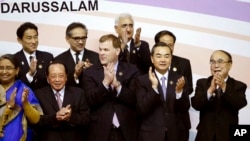North Korea says it is still open to direct talks with the United States, but will not give up its nuclear program unless Washington changes its "hostile" tone and ends sanctions against it.
Speaking Tuesday at the ASEAN Regional Forum in Brunei, North Korean foreign ministry spokesperson Choe Myong Nam said the U.S. is to blame for the recent tensions on the Korean peninsula.
"A vicious circle of intensified tensions has been repeated and we're on the razor's edge, which might break out a war at any time. It was totally caused by the United States. It is absurd that the culprit is talking about others' threats or provocation," said Choe Myong Nam.
North Korea last month unexpectedly offered to talk with the U.S., ending months of warlike rhetoric from Pyongyang following U.N. condemnation of its latest nuclear test.
The U.S. has responded cautiously, saying the North must first show it is willing to give up its nuclear weapons. Six-party talks aimed at nuclear disarmament have been stalled since 2008.
Tuesday's security forum was a rare opportunity to bring together delegates from all six nations involved in those talks. But there was no signs that a breakthrough had taken place.
South Korea's foreign minister Yun Byung-se said that "most ministers" at the summit sent a "very strong message" to Pyongyang that it should give up its nuclear weapons and refrain from provocation.
On Monday, U.S. Secretary of State John Kerry said the United States, China, Japan, and South Korea are "absolutely" unified in their insistence that Pyongyang must denuclearize.
Kerry also used the meeting to urge ASEAN to make progress on a code of conduct covering disputes in the South China Sea, where Beijing has overlapping claims with several Southeast Asian countries.
China, which has been reluctant to deal with ASEAN on the disputes, on Sunday agreed to hold "official consultations" with the regional body on a proposed code of conduct.
Speaking Tuesday at the ASEAN Regional Forum in Brunei, North Korean foreign ministry spokesperson Choe Myong Nam said the U.S. is to blame for the recent tensions on the Korean peninsula.
"A vicious circle of intensified tensions has been repeated and we're on the razor's edge, which might break out a war at any time. It was totally caused by the United States. It is absurd that the culprit is talking about others' threats or provocation," said Choe Myong Nam.
North Korea last month unexpectedly offered to talk with the U.S., ending months of warlike rhetoric from Pyongyang following U.N. condemnation of its latest nuclear test.
The U.S. has responded cautiously, saying the North must first show it is willing to give up its nuclear weapons. Six-party talks aimed at nuclear disarmament have been stalled since 2008.
Tuesday's security forum was a rare opportunity to bring together delegates from all six nations involved in those talks. But there was no signs that a breakthrough had taken place.
South Korea's foreign minister Yun Byung-se said that "most ministers" at the summit sent a "very strong message" to Pyongyang that it should give up its nuclear weapons and refrain from provocation.
On Monday, U.S. Secretary of State John Kerry said the United States, China, Japan, and South Korea are "absolutely" unified in their insistence that Pyongyang must denuclearize.
Kerry also used the meeting to urge ASEAN to make progress on a code of conduct covering disputes in the South China Sea, where Beijing has overlapping claims with several Southeast Asian countries.
China, which has been reluctant to deal with ASEAN on the disputes, on Sunday agreed to hold "official consultations" with the regional body on a proposed code of conduct.




